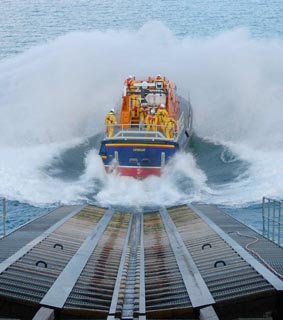 It was an unpleasant windy day with occasional rain squalls whipping across the water. The wind indicator in the Lookout was indicating South Westerly 5 gusting 7. The small sailing boat was making heavy weather of it and the Watchkeeper was concerned. He could see the sails did not appear to be correctly set and the boat was making little progress, with an erratic course. There appeared to be only one person on board and his present rate of progress was more sideways than forward, a line that would take him on to the rocks where the sea was breaking.
It was an unpleasant windy day with occasional rain squalls whipping across the water. The wind indicator in the Lookout was indicating South Westerly 5 gusting 7. The small sailing boat was making heavy weather of it and the Watchkeeper was concerned. He could see the sails did not appear to be correctly set and the boat was making little progress, with an erratic course. There appeared to be only one person on board and his present rate of progress was more sideways than forward, a line that would take him on to the rocks where the sea was breaking.
There was no distress signal but there was obviously something wrong. Was he very inexperienced, had he a sail problem or was he perhaps sick? Time went by, there was no improvement and the Watchkeeper’s remained anxious. As far as he was concerned this was a ‘Do or don’t I?’ situation. He might be OK, but he might not. Should he leave him until he really was in difficulty or should he do something about it now?
We have a direct line to MRCC at Falmouth (Coastguard, perhaps, to you) and training says, ‘If in doubt use it?’ We all know that the emergency services would always prefer to turn out early and not be needed rather than leave it late and make things difficult and dangerous for everyone. If it proves to be unnecessary it is classified as ‘False alarm with good intent’ and there are no recriminations.
So he rang the Centre and spoke to the a Watchkeeper on duty. She talked to her Manager who took the decision to ask for the launch of a lifeboat. The system swung into action and shortly after the Inshore Boat left her slip with three crew members on board and headed out to the potential casualty.
As it turned out when they got there they were not needed. The boat had been having trouble with its sails and the sailor had been trying without success to sort them. He was, no doubt, surprised to see the big RIB bearing down on him, but he confirmed that he was in no danger just having a difficult time. He gave up trying to sail, turned his engine on, and motored happily, and no doubt wetly, back towards Falmouth, eventually both boats disappearing behind Grebe Point.
This is what it is all about. Had he been in real difficulty, had there been no NCI lookout, he and his small boat could well have finished on to the rocks. You do not need storm conditions to smash a small boat in minutes – even a moderate sea will do it. The boat usually hits below surface rocks first, then rolls and throws its crew into the water, where they are left struggling in a tangle of wreckage and lines, the wreckage big enough to brain you and the lines pulling you under to drown you. On a wet and windy day like this there was no one about to see what happened. The sea is fun but can be a dangerous place and most amateur sailors find the huts high on the cliffs a comforting sight.
………………………………………………………………………………………
For the second time we had a stand at the Tregony Horse Show. Anything to get money or recruits – we are desperately short of both. It was good fun, we take it in turn to man these things so as to spread the load. It was a bit windy and just as well we always had two people on as the stand showed a marked inclination to enter the Dog Show which was going on behind! One hand for your hat and one for the stand. There was a lot of interest and two or three people may come down to the Lookout to find out more – if the flag is up we are there. Our collecting tin came away a bit heavier than when we arrived so our thanks to all those who contributed Money is always a problem there is no system of central funding for purchase and maintenance of equipment so we have to rely on what we can raise locally. Don’t forget – If the flag is flying someone is there and will welcome a visit. Or telephone Pat Rigley on 01872501838 or Alan Baptist on 01326270294
